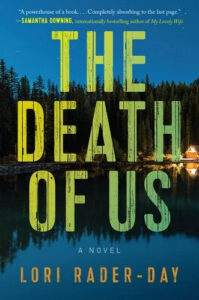My historical novel published in 2021, Death at Greenway, used research on the real people who had lived on the estate of Agatha Christie’s holiday home in the English Riviera during World War II. Faced with the universe of facts I could lay my hands on, I had to be selective about which details were worth including. Complex family arrangements, in particular, didn’t carry enough story weight. My research revealed that, for instance, one married couple had children from his prior marriage and from hers, but also some of her children were from her first husband’s first marriage, some were fostered, some adopted (but not all), and she had given birth to—
You see why I left most of it out.
But it’s tricky. Those were real familial relationships I was tidying up for the sake of publication. We want our stories to feel lived in, real, and real people have complex family arrangements. Through divorces and remarriages, through past relationships and from making room at their table for those who needed caregiving, by biology and all the ways that families are created, family is who we make it. Sometimes, as they say, it’s complicated.
Our literature reflects this. A trope I particularly enjoy is the “found” family. Found family stories are those in which characters, often those whose families have rejected them, choose who they keep close—and it’s not always who they’d expect at the outset of the story. If you think #foundfamily is the trope of YA lit or modern culture, I submit to you: Matilda, Pippi Longstocking, Anne of Green Gables, Charlotte’s Web, The Great Gilly Hopkins, The Fellowship of the Rings, The Outsiders…
I could go on. With so many children’s stories devoid of parents in one way or another, many of our favorite books tell the stories of those who must construct a sense of home from what little they have to work with.
There are formative texts in that list above, for me. These are some of the books that created who I am as a reader—and as a writer.
In The Death of Us, my new novel out this month, Lissette Kehoe is at once a mother, and not. She faces the destruction of all she cares about when a submerged car is found on her family’s property and long-silenced secrets are revealed. Her family isn’t found—it’s created, through Lissette’s force of will, from the broken pieces she’s literally been handed.
Just like real people often have to.
Crime fiction, too, has its share of found or created families. For your reading pleasure, I forced this eclectic group of books into the same space, distant cousins forced to sit at the same crowded kids’ table at family dinner.
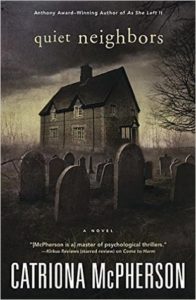
Quiet Neighbors by Catriona McPherson
When Jude’s life falls apart, she goes to the last place she remembers being happy. A bookshop, of course. The shop is a mess and so is the owner. Then a pregnant girl shows up, with an agenda, and Jude gets a chance to tidy up more than stacks of books.
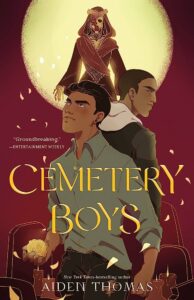
Cemetery Boys by Aiden Thomas
Yadriel, a trans man, wants to prove he has his family’s magical skills—so he brings forth a ghost. The trouble is, Julien is the wrong ghost, and he won’t return to the land of the dead until his demands have been met. But of course by then, Yadriel’s not so sure he can live without Julien.
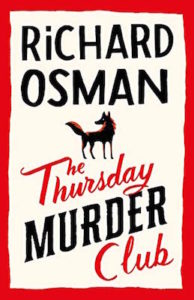
The Thursday Murder Club by Richard Osman
Life should be peaceful at the luxury retirement village of Coopers Chase, except that four of its residents are digging up cold murder cases—and trouble. The intense pressure of being targeted by mobsters and assassins has a way of turning friends into family. There are four books in the series, all hilarious.
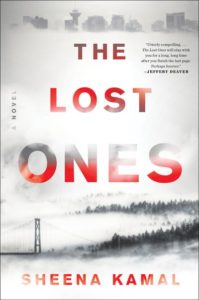
The Lost Ones by Sheena Kamal
A biracial product of the foster system, transient, and scarred by a violent past, Nora is no help to anyone, including the mutt, Whisper, she barely claims as her own. But when the daughter she gave up for adoption as an infant goes missing, she has to save the kid from… everything. And rely on everyone. There are two more books in the series, if you fall in love.
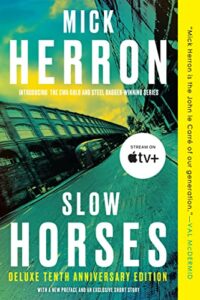
Slow Horses by Mick Herron
The agents who populate the dreariest, most dead-end office of MI5 wouldn’t consider themselves family. That would make slovenly boss Jackson Lamb their…dad? But when a Muslim teen is kidnapped for political headlines, they pull together to like one, big… disgruntled group of officemates. There are nine Slough House novels and some novellas; you’ll want to read them all.

The Postscript Murders by Elly Griffiths
When the resident of a rest home dies, Detective Sergeant Harbinder Kaur isn’t concerned. Until it’s revealed that the deceased woman used to help authors plan murders for their books, and now they’re starting to drop dead, too. Kaur receives help from unlikely deputies—other residents of the care home. A sequel to the Edgar Award-winning Stranger Diaries, but you can start here, if you’re a monster.
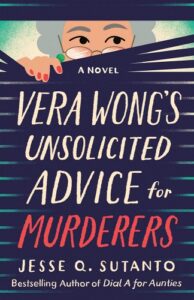
Vera Wong’s Unsolicited Advice for Murderers by Jesse Q. Sutanto
A lonely widow and mother who doesn’t hear often enough from her son finds a dead body in her teashop. She vows to find the murderer and starts by tampering with evidence. The deeper Vera is drawn into her investigation, the more she comes to consider all her identified murder suspects as… family.

Meddling Kids by Edgar Cantero
They were a Scooby-Doo-like gang back in the day, when the Blyton Summer Detective Club revealed the Sleepy Lake monster to be just another sad, masked shyster. Now, as adults, they’ll need to band together once more to get to the real truth behind the terrible things happening in the Zoinx River Valley, and maybe save the world, once and for all.
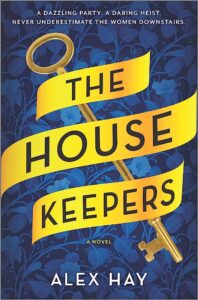
The Housekeepers by Alex Hay
Fired from her top job below stairs as the housekeeper of a luxurious London home, Mrs. King plans her revenge: to strip her former employer’s house to the bone. To pull off a grand heist during season’s most outlandish costume ball, she enlists an oddball mix of thieves and tricksters to help—all women. A sisterhood in the making.
***


